 | « Back to article | Print this article |
Navratri Kolu: A peek into the life of the doll makers of Tamil Nadu
From the Krishna Leela to cricketers, the tradition of doll making for Navratri Kolu has come a long way. Shobha Warrier visits generations of doll makers in Tamil Nadu.
As you enter the tiny living room of Vasanthi's house in Chennai, all you see are magnificently colourful dolls arranged neatly on every available surface, including the floor. The kitchen floor is also full of dolls waiting to be painted.
Sitting on the floor painting tiny dolls are 60-year-old Vasanthi, her 38-year-old daughter Revathy and her 15-year-old grand-daughter Pavithra.
They are now in the busiest time of the year; though they start making dolls as early as January, the maximum number of dolls is sold during Navratri. This is the time of the year when the Kolu (Tamil households) or Bommala Koluvu (Telugu households), representing a divine presence, is set up in homes.
Making clay dolls (bommai) has been the traditional occupation of Vasanthi's family for generations. Since she can remember, she has been involved in all aspects of it -- from moulding clay and firing dolls in the kiln to painting them.
"The most difficult part is drawing the eyes and giving expression to them. Once you master that, you can do anything," she says,
She is also vocal about her happiness that her daughter continues to assist her and now her grand-daughter joins them.
Pavithra, who helps out after school hours, says she grew up watching her mother and grandmother work on the dolls, and it was natural for her to be interested in it.
Navratri Kolu: A peek into the life of the doll makers of Tamil Nadu
Anwar Basha, 25, also grew up like her.
His mother Lakshmi's family was involved in doll making. She continued to assist her mother in making bommai even after she fell in love with Mastan, a Muslim tailor, and got married.
Mastan eventually joined the business. "I used to do fine painting on the dolls, which many appreciated. Soon I realised I enjoyed what I was doing," he says.
As a boy, Anwar started out doing odd jobs, helping his family. From age 10, he began working on the moulds and painting dolls with both the brush and the spray gun. A chemistry graduate, he takes care of the family business full time.
"This is our traditional occupation, what my mother's family has been doing for at least 100 years. What is wrong in me taking it up?" he asks.
Anwar is so involved in all aspects of the art that he has also become an expert of the Hindu Puranas, which were traditionally depicted in the Kolu.
Some of the most popular depictions were from the Ramayana, Mahabharata, Krishna Leela, Srirama Pattabhishekam, Seetha Kalyanam, Nataraja Thandavam, Vrindavana Krishna.
With time, more stories and more characters from the Puranas were added, slowly making way for local legends and contemporary depictions.
Vasanthi, who has been in the business for over 40 years, has witnessed the changes: "Today, people want contemporary stories like players on the cricket field, play grounds, parks, etc. Some people tell us that they are bored of seeing (gods like) Lakshmi, Saraswathi, Vinayakar, Muruga, Parvathy, etc, and they want fancy dolls. What can we do but make what the customers demand?"
The artisans have also other castes and other religions begin to embrace this tradition, which was earlier a Brahminical affair. "These days, everybody likes to have Kolu during Navaratri. Families look at it as an occasion to invite friends and relatives home," Vasanthi says.
Navratri Kolu: A peek into the life of the doll makers of Tamil Nadu
The artisans say they have also started preparing dolls based on Biblical characters because the Christian community has adopted the tradition, for Christmas.
With more people adopting the tradition, the demand is booming for the bommai artisans, but not the profit line.
Between customers who don't appreciate the cost that comes with handcrafted dolls and lack of encouragement from the government -- they are not allowed to have a kiln inside the city -- they complain that their livelihood bears the brunt and makes the next generation wary of continuing in the family business.
Pavithra, for instance, plans to continue helping her family, but has no plans to be a full-time artisan.
Sathyanarayana, another artisan, says, "My three children are not interested in continuing this family tradition. I am educating them because of this, but they feel I don't get any respect or money for what I do."
Anwar echoes Vasanthi when he says, "If traditional arts have to survive, you need support from the government, but we not only get no support we are discouraged to continue the tradition. If this situation continues, the art will die a slow death, which we are sure nobody wants."


